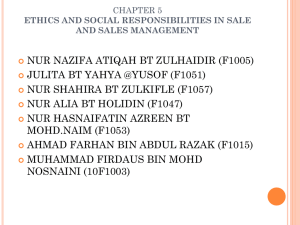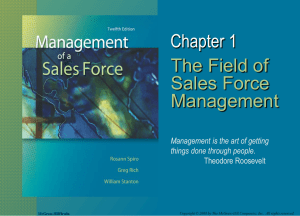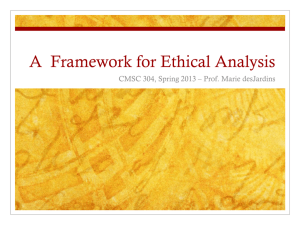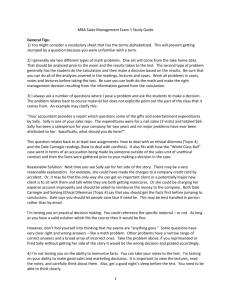Chapter 2
advertisement
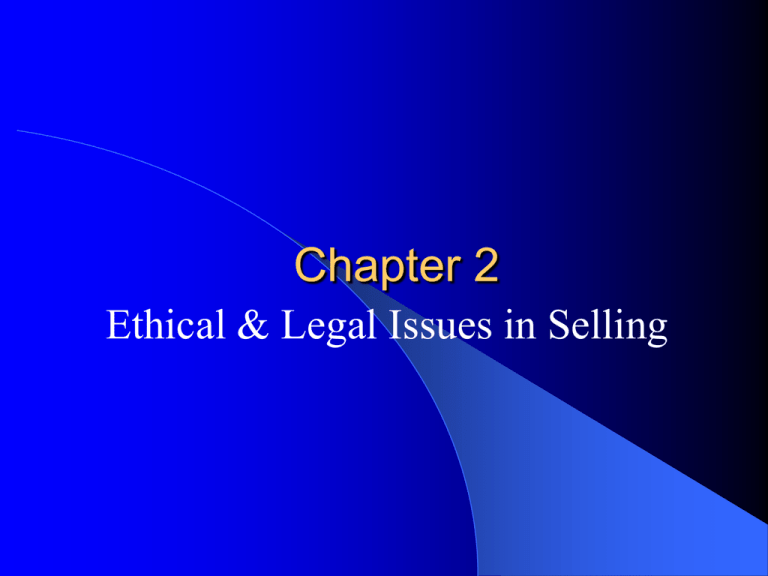
Chapter 2 Ethical & Legal Issues in Selling Ethics Definition *Principles governing the behavior of an individual or a group. These principles establish appropriate behavior indicating what is right and wrong. The Evolution of Personal Selling Exhibit 2.1 – Page 31 Ethics & Partnering Relationships *Built on trust *Studies show trust deteriorates rapidly *See example questions – Page 36 *We will be doing 6 ethical exercises involving the professional selling profession Factors influencing ethical behavior Note: Exhibit 2.2. and 2.3 in text (Page 37) Factors affecting Ethical Behavior of salespeople: Salesperson (Personal) Objectives Company objectives Customer Objectives Factors influencing ethical behavior *positive ethical climate highly correlated to job satisfaction, commitment, & low turnover among employees Values of significant others play a critical role in shaping values. Be careful who you associate with!! Some studies show politicians, preachers, and professors are more unethical than salespeople!! A Personal Code of Ethics Develop an individual standard of conduct – Line in the sand! If you disagree with the firm’s stance on ethical issues you can: 1) Ignore personal values and do what the company asks 2) Take a stand and tell your employer what you think 3) Refuse to compromise your principles Checklist For Making Ethical Decisions P. 36 – Exhibit 2.5 Relationships with Customers • • • Deception Deliberately presenting inaccurate information “White lies” Bribes, Gifts, and Entertainment Bribes- payments made to buyers to influence their purchase decision Kickbacks- payments made to buyers based on the amounts of orders placed Special Treatment Taking advantage of their status Continued • Confidential Information Disclosing confidential information can be hazardous to the level of customer trust with the salesperson • Back-Door Selling Occurs when salespeople ignore the purchasing agent’s policy, go around his or her back, and contact other people directly involved in the purchasing decision Relationships with company See exhibit 2.6 & 2.7 – P-41 – Doctors’ and Buyers’ views of ethical behavior Relationship’s with the Salesperson’s Company • • Expense Accounts Incurred expenses are necessary Should not take advantage of the account for personal gains • Reporting Work-Time Information and Activities Employees are expected to work Solution: Daily call reports • • • • Switching Jobs Give ample notice Offer assistance during the transition phase Don’t burn your bridges Don’t take anything that doesn’t belong to you Relationships with Company/Colleagues/Competitors • • • Sexual Harassment Includes unwelcome sexual advances, requests for sexual favors, jokes or graffiti, and physical conduct Quid Pro Quo Hostile environment • Taking Advantage of Other Salespeople Unethical when salespeople are too aggressive in pursuing their own goals at the expense of their colleagues Legal Issues Statutory law- based on legislation passed either by state legislatures or by Congress Administrative laws- established by local, state, or federal regulatory agencies Common law- grows out of court decisions Uniform Commercial Code & Sale Legal guide to commercial practice in the United States Note following terms: Agent- a person who acts in place of his or her company has the authority to legally obligate their firm in a business transaction Sale - the transfer of title to goods by the seller to the buyer for a consideration known as price Contract to sell- anytime a salesperson makes an offer and receives an unqualified acceptance Title & Risk of Loss Invitation To Negotiate- sales presentation Offer- salesperson quotes specific terms Orders- written offers that become contracts when they are signed by an authorized representative in the salesperson’s company Title and Risk of Loss FOB (free on board) destination- seller has title until the goods are received at the destination -any loss or damage incurred during transportation is seller’s responsibility FOB factory-the buyer assumes this responsibility & risk Relationships (Continued) • • Oral Vs. Written Agreements oral agreements just as binding as written agreements written agreements are required for sales over $500 • Obligations and Performance once there is an agreement of terms both firms must perform according to those terms in “good faith” Warranties an assurance by the seller that the products will perform as presented Express warranty- oral or written statement by the seller Implied warranty- not actually stated but is still an obligation defined by law Misrepresentation or Sales Puffery Sales puffery involves opinions with glowing descriptions (Ex.- “Our service can’t be beat”) Misrepresentation involves misrepresentation of facts and warranties (Ex.-”Our system will reduce your inventory by 40%”) False Claims Act Also known as the Lincoln Law, passed in 1863 Purpose – To prevent fraudulent claims by contractors and protect citizens against false claims. A person bringing a fraud claim may share in damages if contractor is found guilty! Misrepresentation Credulous Person Standard – P.48 a company and the salesperson have to pay damages if a reasonable person could misunderstand the statement • Illegal Business Practices Sherman Antitrust Act – 1890 Clayton Act – 1914 Federal Trade Commission Act – 1914 Robinson-Patman Act – 1934 ALL prohibit unfair business practices that may reduce competition Illegal Business Practice Business Defamation occurs when a salesperson makes unfair or untrue statements to customers about a competitor, its products, or its salespeople Reciprocity a special relationship in which two companies agree to buy products from each other – illegal if forced Tying Agreements a buyer is required to purchase one product in order to get another product – typically illegal, not always Illegal Business Practices Conspiracy and Collusion Conspiracy- an agreement between competitors before customers are contacted Collusion- competitors working together while the customer is making a purchase decision Interference with Competitors Illegal interference may occur when: 1) Trying to get a customer to break a contract with a competitor 2) Tampering with a competitor’s product 3) Confusing a competitor’s market research by buying merchandise from stores Restrictions on Resellers Resale Price Maintenance – legal for manufacturers, wholesalers, retailers and resellers to set minimum prices Do not have to sell to everyone Can offer Spiffs – incentives to push products – legal if everyone agrees Privacy Laws & Do-Not-Call Law Must notify consumers about use of their information European laws are more strict Do-Not-Call Law applies if you are NOT already a customer Rules do not apply to business phones International Ethical & Legal Issues Lubrication – involves small gifts & money to help make the sale Subordination – involves larger sums of money to high ranking officials illegal or ignore an illegal act. Even in countries where bribery is common, it is still considered unethical Resolving Cultural Differences Cultural Relativism – view that no culture’s ethics are superior Ethical Imperialism – view that your country’s standards should be applied worldwide. See P. 52 for examples Foreign Corrupt Practices Act – illegal for U.S. companies to pay bribes to foreigners Selling Yourself!! Four key points – learn all in this class! *Attitude *Appearance *Oral communication skills *Written communication skills Ethical Example In Class Designed To Make You… THINK Article: “How To Make The Sale And Remain Ethical” Why we have unethical behavior: Lack of teaching Learn from media (not good) Influence of immediate supervisor Pressure to reach objectives Why is ethical behavior difficult to practice: Adherence to strict chain of command Must be communicated and reinforced

